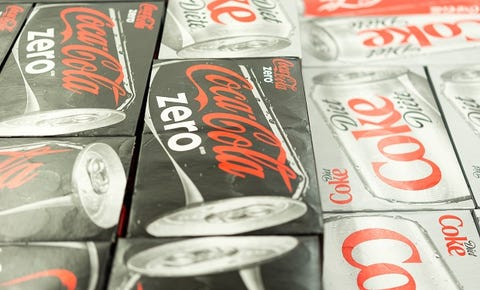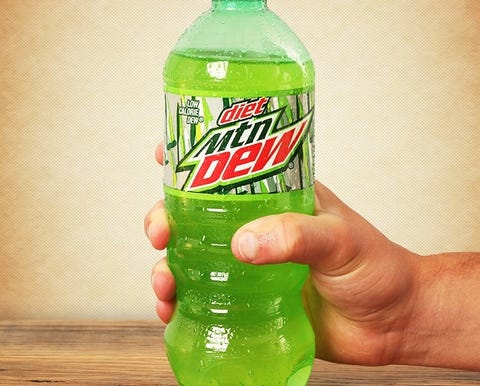List of Diet Drinks Without Aspartame
This week, a freshly revamped Diet Pepsi—with the phrase "now aspartame free" on its silver label—will hit supermarket shelves nationwide. PepsiCo ditched the controversial sweetener aspartame in response to consumer demand, replacing it with sucralose, known by the brand name Splenda, and acesulfame potassium, or ace-K, both sweeteners thought to be safer.
"The change reflects widespread public concern about the safety of aspartame," says Lisa Y. Lefferts, senior scientist at the Center for Science in the Public Interest (CSPI), a food safety watchdog group. "Diet sodas contain several questionable ingredients, but aspartame is the one we're most concerned about."
Several animal studies have linked aspartame to cancer risk, and a highly controversial study from the Harvard School of Public Health in 2012 explored a possible link in humans, although even the researchers from that study admitted that it was a weak link. A study last year by the American Cancer Society did not find a link. Other artificial sweeteners—including ace-K and sucralose (both of which are in the newly reformulated Diet Pepsi)—may also pose a cancer risk, and there are safety questions about artificial colors, including the caramel coloring found in most sodas (even some ginger ales), as well as certain emulsifiers.
Before you spit out the diet cola swishing around your mouth right this second, the fact is that the cancer risk from food additives is likely pretty small, Lefferts says. And diet sodas are still likely a better choice than their full-sugar cousins. "We know that sugar drinks are a major cause of obesity and have also been linked to heart disease, diabetes, and metabolic syndrome, not to mention tooth decay," Lefferts says. (Though diet soda's hardly healthy; check out this comparison of regular soda vs. diet soda.)
Based on what we know about diet soda's main components, here's how they stack up.
Least Harmful?
The newly reformulated Diet Pepsi no longer has aspartame—so that may push it to the top of the list. But it still contains acesulfame potassium (ace-K), which is poorly tested, although two studies suggest it may pose a cancer risk, as well as sucralose (Splenda), which the CSPI is now approaching with caution since the authors of a forthcoming study link it to leukemia. "The thing is, aspartame has undergone better cancer testing than these other artificial sweeteners," Lefferts explains, "so while it appears to be the worst from a risk perspective, it's possible that these others are just as bad and we just don't know it."

Getty Images/Bloomberg
MORE: 8 Things That Happen When You Finally Stop Drinking Diet Soda
Diet Pepsi also contains caramel color, which is not like caramel you might make at home by melting sugar in a saucepan. "The caramel color used in soda is made with ammonia and sulfites under high pressure and temperatures," Lefferts explains. In the process, contaminants like a cancer-causing agent called 4-methylimidazole, or 4-MI, can form. The levels of 4-MI are much higher in Diet Pepsi than in Diet Coke, according to testing by Consumer Reports, although its most recent testing shows improvements.
In 2011, the International Agency for Research on Cancer, an arm of the World Health Organization, concluded that 4-MI is "possibly carcinogenic to humans," and California now lists it as a carcinogen. Consumer Reports' testing has found that some sodas sold in California have much lower levels of 4-MI than the same brands sold in other states.
Diet Coke with Splenda also carries no risks from aspartame, but the sweetness comes from sucralose, which is now on the caution list, per the CSPI, as well as ace-K, which is on CSPI's avoid list. (Check out 57 sneaky names for sugar.)
Somewhere in the Middle
Aspartame is the go-to sweetener in most diet sodas, so regular drinkers might think twice about what they're guzzling. Their aspartame content, in order from least to most per 8-ounce bottle: Sprite Zero (50 mg), Coke Zero (58 mg), Pepsi Max (77 mg), Diet Pepsi and Caffeine-Free Diet Pepsi (111 mg and 118 mg, respectively), Diet Dr. Pepper (123 mg), Diet Coke and Caffeine-Free Coke (125 mg).

Getty Images/Roberto Machado
MORE: 4 Ways To Beat Your Diet Soda Addiction In One Week
Keep in mind that all of them—except Sprite Zero—also contain caramel color and thus the potential for 4-MI.
And unless they're labeled as "caffeine-free," the caffeine in these sodas can be a problem for children, pregnant women, and people sensitive to caffeine.
The Worst
Diet Mountain Dew may well be the riskiest diet soda because it has the greatest number of questionable additives. Not only does it contain aspartame, ace-K, and sucralose, but it also has more caffeine than most diet sodas, and it gets its color from yellow #5, which has been shown to cause hyperactivity in some children. As a kicker, Diet Mountain Dew also contains the emulsifier brominated vegetable oil (BVO), which has been shown to leave residues in body fat and the fat in the brain, liver, and other organs. The FDA in 1970 declared BVO not "generally recognized as safe," but permitted its use on an interim basis pending additional study, and it hasn't budged from that status since. PepsiCo and Coca-Cola have pledged to remove BVO from any of their drinks that contain it, but they didn't say when that might happen.

stock
MORE: 8 Things That Happen When You Quit Caffeine
At the end of the day, Diet Pepsi's reformulation without aspartame may just be one last-gasp effort by the diet soda industry to revive its flagging sales. More and more people are simply making healthier choices, including drinking low- and no-calorie beverages made without the worst of the sweeteners (like these delicious Sassy water recipes). A handful of examples: Steaz (sweetened with stevia and erythritol, a sugar alcohol that CSPI considers safe), DrinkMaple Pure Maple Water (with no added sugars, and half the natural sugar in coconut water), Reed's Ginger Brews (the "light" version is sweetened with stevia leaf extract and honey), Hot Lips Pear Soda (with no added sugar), and Zevia Cola (made with erythritol, stevia extract, and monk fruit extract).
This content is created and maintained by a third party, and imported onto this page to help users provide their email addresses. You may be able to find more information about this and similar content at piano.io
List of Diet Drinks Without Aspartame
Source: https://www.prevention.com/health/a20474110/worst-diet-sodas/